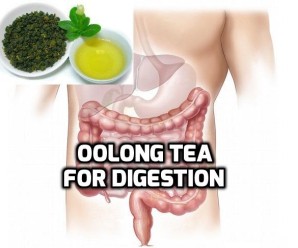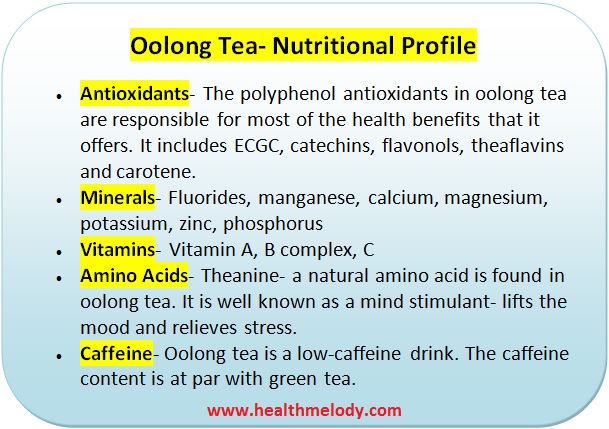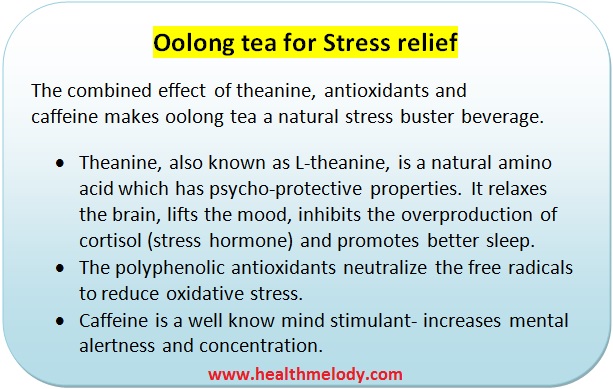
Oolong tea for Digestion and Weight Loss
Oolong tea, also known as Wu long tea, is a traditional Chinese tea with health benefits quite similar to green tea, but, with a mild, pleasant taste. Oolong tea is a popular choice for the habitual black tea (or coffee) drinkers who want to switch over to healthier options, but, can’t deal with the grassy, bitter taste of green tea.
Benefits of oolong tea for digestion are well acknowledged in China. That’s why it is widely served in Chinese restaurants along with the regular meals. It has a stimulating action on the digestive system and body metabolism.
Read more: Simple yoga after meals to improve digestion
Some quick facts about Oolong tea
- Oolong tea was first manufactured around 400 years back in China. It is particularly popular in parts of China and Taiwan.
- As of today, oolong tea is only 2% of the total tea production while green tea is 20%. But, due to the “taste” advantage, oolong tea is becoming popular very quickly among the masses as a low-caffeine, natural drink for weight loss and digestion.
- It is manufactured from the same tea plant which is used for green tea and black tea. The only difference is- degree of fermentation (oxidation) during tea manufacturing. Black tea is fully oxidized and green tea is unoxidized- oolong tea falls in between; it is semi (partially) oxidized.
Caffeine and Digestion
In general, people with weak digestive system are advised to reduce the coffee and black tea intake because of the high caffeine content. Caffeine, when consumed in excess, can hamper the digestive health in many ways:
- Highly caffeinated drinks like coffee and black tea are acidic in nature. Hence, over consumption of these drinks can worsen the digestive issues like hyperacidity, gastritis, ulcer and heartburn.
- Over consumption of caffeinated drinks can trigger insomnia (lack of sleep), stress and anxiety. These symptoms would fasten the heart rate and decrease the blood supply to the digestive organs to hamper the digestion process.
- Excessive caffeine can cause dehydration which can trigger constipation.
- Excessive caffeine can interfere with the absorption of nutrients from the food that you eat. It would cause nutritional deficiency and hence, poor digestion.
Caffeine content- Oolong tea
As discussed above, the same tea plant is used to manufacture all the tea varieties- black, green and oolong- and all contain caffeine in varying amounts. The caffeine content in any tea would vary according to various factors such as:
- Tea plant growing conditions- region and season
- Tea manufacturing process- degree of oxidation and drying temperature
- Tea brewing conditions- water temperature, tea steeping time, tea bag or loose tea
Hence, it is quite difficult to come up with an exact figure of caffeine content for any tea variety. It is better suggested in ranges.
The caffeine content of various commercially available tea brands is measured and below ranges are suggested:
- The caffeine content in oolong tea is quite comparable to that of green tea.
- The caffeine content in oolong tea is around one-third of black tea and one-fourth of brewed coffee when consumed in the same amount.
In short, oolong tea is low in caffeine and drinking a few cups of it should not hamper the digestion process.
Oolong tea for Digestion
Bad digestion is the root of all evil- Hippocrates, the father of modern medicine
Optimum digestion ensures that you get all the vital energy and nutrients from the food you eat. Without proper digestion, eating even the very best quality food is not of much use.
Poor digestion can lead to:
- Low energy level
- Nutritional deficiency
- Accumulation of body toxins (undigested food, disease causing microbes and related wastes)
Poor digestion has a role to play in almost human disease, ranging from minor issues like acne, bloating, constipation, headache, bad breath to chronic diseases like arthritis, heart issues, colitis, eczema, psoriasis and even cancer.
Let us discuss how oolong tea is going to help here:
- Speed up the body metabolism
Poor digestion is a metabolism disorder- a compromised body metabolism automatically slows down the digestion process in the long run. Thanks to catechins (antioxidants) and caffeine, drinking oolong tea can speed up the body metabolism by increasing the energy expenditure.
According to a study published in the Journal of Medical Investigation, Aug 2003- drinking oolong tea can increase the body metabolism by 10% for up to 2 hours after drinking the tea. The body metabolism was measured in terms of energy expenditure using a calorimeter.
- Anti-obesity activity
Obesity and poor digestion have a few things in common- unhealthy diet, overeating, irregular lifestyle, lack of physical activity and stress. Obesity can trigger poor digestion and vice versa.
As discussed above, oolong tea boosts the body metabolism to elevate the calorie burning rate. It would help to burn more of the accumulated fats to reduce obesity.
The researchers at Ehime University, Japan suggested oolong tea as a natural remedy to treat obesity and fatty liver. The obese mice, fed on a high-fat diet, were given oolong tea for 10 weeks. It resulted in measurable reduction in obesity and significant relief from fatty liver symptoms.
Another case study published in the Journal of nutrition, Nov 2001 observed that drinking 6 cups of oolong tea per day for a period of 3 days increased fat oxidation rate (breakdown of fats into smaller compounds) by 12%.
- Promotes healthy gut bacteria
The human gut contains trillions of healthy bacteria (probiotics) which plays a vital role in overall body functioning. Few of the main functions of probiotics are:
- Proper breakdown of food particles and absorption of food nutrients
- Inhibits the growth of pathogens (disease causing bacteria)
- To maintain a healthy immune system
What factors can damage gut flora
- Poor diet
- Overuse of antibiotics
- Over consumption of alcohol
- Stress
- Exposure to toxic chemicals and pollutants
- Contaminated drinking water
- Chronic illness
How oolong tea is going to help here?
According to a study published in the health journal- Research in Microbiology, Nov 2006- the polyphenolic antioxidants in oolong tea act as prebiotics- they nourish the probiotics and assure their growth and development.
- Reduces bowel inflammation
Rich in polyphenol antioxidants, drinking oolong tea can reduce the bowel inflammation to ease symptoms related to colitis, ulcer and Crohn’s disease.
Read more: Turmeric is an anti-inflammatory herb for digestive health
- Stress relief
Under stress, the heart rate goes up and the blood supply increases towards brain and limbs so that you can think, fight or flee – whatever required to tackle the situation. It would result in restricted supply of blood to the digestive organs- it implies poor metabolism and digestion.
A case study published in the Journal of Health Science, Aug 2003 discussed the stress fighting properties of oolong tea. A total of 55 university students were randomly divided in three groups and administered 4 cups per day of oolong tea or barley tea or plain water for a period of one week. On the 7th (last) day, they were placed in the classroom and assigned overnight workload. The increase in cortisol levels due to this vigil stress was less in case of oolong tea group than the others. Also, the other symptoms of stress such as eye fatigue, stiffness of the shoulders and headache were less severe in those students who drank oolong tea.
Read more: Stress buster Yoga for immediate relief
Dosage- How to consume
Drink 3 cups of oolong tea every day around one hour after the meals.
To prepare one cup of refreshing oolong tea, take 200-250 ml (6-8 ounces) of boiling water and add 2 grams (one teaspoon) of oolong tea in it. Let it steep for 3-5 minutes. Strain the tea leaves and drink it. You may prefer tea bag in place of loose tea leaves for convenience.
Safety precautions and side effects
Drinking 3 cups of oolong tea is quite safe for people of all ages. Pregnant and nursing women should consult their doctors before consuming it on a daily basis.
Some additional precautionary measures:
- Maintain a gap of one hour between the meals and drinking oolong tea otherwise the caffeine and antioxidants of oolong tea can compete with the food nutrients and inhibit their absorption by the system. It may result in nutritional deficiency.
- Avoid drinking oolong empty stomach in the morning or before the breakfast.
- Don’t drink oolong tea late at night as it may interfere with sleep due to caffeine content.
When consumed in excess, oolong tea can pose side effects linked to caffeine abuse such as:
- Frequent urination
- Nausea or vomiting
- Headache
- Insomnia
- Rapid heart beat
- Spike in blood pressure
From where to buy
Due to varying degree of oxidation, taste and color of oolong tea would vary. However, it would be less bitter/ grassy that green tea and habitual coffee/ black tea drinkers would find its taste more appreciable than green tea.
The less oxidized tea would be greenish in color and the highly oxidized tea would be dark (reddish brown) in color.
Buy organic (pesticide free) oolong tea from a store near to you or check online for some discounts:
If you are from USA, click here
If you are from UK, click here
If you are from India, click here
Takeaway
Oolong tea is a natural beverage- low in caffeine and high in antioxidants. In China, it is popular as “slimming tea” because it increases the calorie burning rate naturally. To avail the optimum benefits of oolong tea for digestion, drink 3 cups every day after the meals along with a healthy diet and lifestyle.
References
http://www.bioline.org.br/pdf?pr07021
https://www.ncbi.nlm.nih.gov/pubmed/13678386
https://www.ncbi.nlm.nih.gov/pubmed/10094584
https://www.ncbi.nlm.nih.gov/pubmed/16962743
http://jhs.pharm.or.jp/data/49(6)/49_436.pdf
https://www.ncbi.nlm.nih.gov/pubmed/11694607





